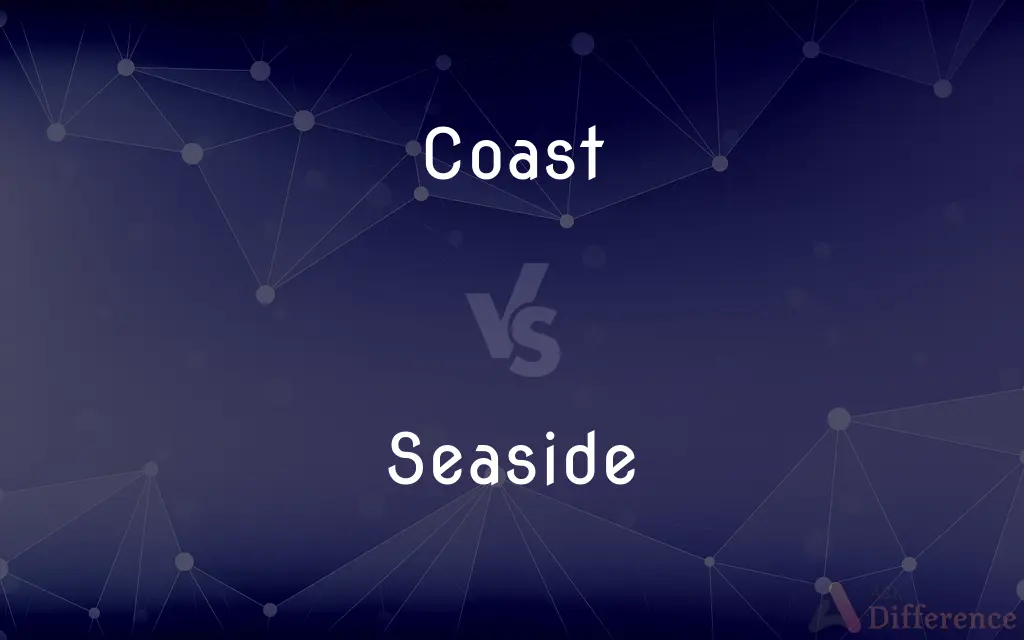Coast vs. Seaside — What's the Difference?
By Tayyaba Rehman & Urooj Arif — Updated on March 18, 2024
Coast refers to the land along the edge of the sea or ocean, while seaside is the area near the sea, often used to describe resort or vacation areas.

Difference Between Coast and Seaside
Table of Contents
ADVERTISEMENT
Key Differences
A coast is the land that borders the sea, encompassing a wide area that includes beaches, cliffs, and the immediate hinterland. It is a geographical term that refers to the interface between land and sea, marking the boundary of terrestrial and marine environments. Whereas the seaside is specifically the area by the sea that is often associated with recreational activities. It is a term that commonly describes places known for their scenic beauty and leisure facilities, such as beaches, boardwalks, and vacation spots.
The coast serves as a significant area for various ecological systems, economic activities such as fishing and shipping, and is subject to environmental processes like erosion and sedimentation. It has a broader meaning, encompassing not just the leisure and recreational aspects but also the economic, ecological, and geographical significance of the land-sea interface. On the other hand, the seaside is primarily associated with leisure, tourism, and recreation, focusing on the human experience of the coast rather than its ecological or economic aspects.
In terms of usage, "coast" is used to describe the broader geographical area, which can include both natural and developed land. It includes regions that might not be directly accessible for leisure activities but are important for their natural features or as part of the coastal ecosystem. The term "seaside," however, specifically refers to areas developed or naturally suited for tourism and leisure, highlighting the beauty and recreational potential of the coast.
The coast can vary greatly in appearance and composition, ranging from rocky cliffs and rugged coastlines to broad, sandy beaches. This diversity reflects the dynamic interactions between the land and sea, including the effects of weather, ocean currents, and human activities. Conversely, the seaside is typically envisioned as sandy beaches with facilities for tourists and visitors, such as hotels, amusement parks, and beachfront promenades, although it can also include natural, undeveloped areas that attract people for their scenic beauty.
While the coast encompasses the entire boundary between land and sea, regardless of its use or accessibility, the seaside is more about the human experience of this boundary. It emphasizes the areas of the coast that are particularly suited to or developed for enjoyment and relaxation by the sea, often characterized by a more focused and intimate connection with the marine environment.
ADVERTISEMENT
Comparison Chart
Definition
Land along the edge of the sea or ocean.
Area near the sea, often related to recreation.
Focus
Geographical, ecological, and economic aspects.
Leisure, tourism, and recreation.
Usage
Broad geographical area.
Areas developed or suited for tourism.
Composition
Can include cliffs, beaches, hinterland.
Often characterized by beaches, boardwalks.
Human Interaction
Varied, from minimal to intensive.
Primarily focused on enjoyment and relaxation.
Compare with Definitions
Coast
Marks the land-sea interface.
The Oregon coast is known for its rugged beauty.
Seaside
Beaches, promenades, amusement parks.
The seaside promenade features shops and cafes.
Coast
Site of shipping, fishing, and more.
The coast plays a vital role in the local economy through its ports.
Seaside
Associated with vacations and fun.
The seaside resort was bustling with tourists.
Coast
Includes cliffs, dunes, and beaches.
The coast's landscape changes dramatically from north to south.
Seaside
Known for picturesque landscapes.
The seaside offers stunning views of the sunset over the sea.
Coast
Supports diverse ecosystems.
Coastal areas are crucial for marine biodiversity.
Seaside
Places developed or natural for enjoyment.
Families flock to the seaside for the warm summer months.
Coast
Not all coasts are accessible for leisure.
Some stretches of the coast are preserved for their ecological value.
Seaside
Developed for visitor enjoyment.
Seaside towns often have numerous hotels and attractions.
Coast
The coast, also known as the coastline or seashore, is defined as the area where land meets the sea or ocean, or as a line that forms the boundary between the land and the ocean or a lake. Earth has around 620,000 kilometres (390,000 mi) of coastline.
Seaside
The seashore.
Coast
Land next to the sea; the seashore.
Seaside
The area by and around the sea; including the beach, promenade or cliffs
This summer, I'm going to the seaside at Weymouth - I'm very excited about it!
Coast
The water near this land
Fish of the Atlantic coast.
Seaside
Related to a seaside.
Coast
Coast The Pacific coast of the United States.
Seaside
The land bordering on, or adjacent to, the sea; the seashore. Also used adjectively.
Coast
A hill or other slope down which one may coast, as on a sled.
Seaside
The shore of a sea or ocean regarded as a resort
Coast
The act of sliding or coasting; slide.
Coast
(Obsolete) The frontier or border of a country.
Coast
To slide down an incline through the effect of gravity.
Coast
To move without use of propelling power.
Coast
To act or move aimlessly or with little effort
Coasted for a few weeks before applying for a job.
Coast
(Nautical) To sail near or along a coast.
Coast
To sail or move along the coast or border of.
Coast
The edge of the land where it meets an ocean, sea, gulf, bay, or large lake.
The rocky coast of Maine has few beaches.
Coast
(obsolete) The side or edge of something.
Coast
(obsolete) A region of land; a district or country.
Coast
(obsolete) A region of the air or heavens.
Coast
(intransitive) To glide along without adding energy; to allow a vehicle to continue moving forward after disengaging the engine or ceasing to apply motive power.
When I ran out of gas, fortunately I managed to coast into a nearby gas station.
Coast
To sail along a coast.
Coast
(intransitive) To make a minimal effort; to continue to do something in a routine way, without initiative or effort.
Coast
To draw near to; to approach; to keep near, or by the side of.
Coast
To sail by or near; to follow the coastline of.
Coast
To conduct along a coast or river bank.
Coast
To slide downhill; to slide on a sled upon snow or ice.
Coast
The side of a thing.
Coast
The exterior line, limit, or border of a country; frontier border.
From the river, the river Euphrates, even to the uttermost sea, shall your coast be.
Coast
The seashore, or land near it.
He sees in English ships the Holland coast.
We the Arabian coast do knowAt distance, when the species blow.
Coast
To draw or keep near; to approach.
Anon she hears them chant it lustily,And all in haste she coasteth to the cry.
Coast
To sail by or near the shore.
The ancients coasted only in their navigation.
Coast
To sail from port to port in the same country.
Coast
To slide down hill; to slide on a sled, upon snow or ice.
Coast
To draw near to; to approach; to keep near, or by the side of.
Coast
To sail by or near; to follow the coast line of.
Nearchus, . . . not knowing the compass, was fain to coast that shore.
Coast
To conduct along a coast or river bank.
The Indians . . . coasted me along the river.
Coast
The shore of a sea or ocean
Coast
A slope down which sleds may coast;
When it snowed they made a coast on the golf course
Coast
The area within view;
The coast is clear
Coast
The act of moving smoothly along a surface while remaining in contact with it;
His slide didn't stop until the bottom of the hill
The children lined up for a coast down the snowy slope
Coast
Move effortlessly; by force of gravity
Common Curiosities
Are seaside areas only found in natural settings?
While seaside areas often take advantage of natural beauty, many are heavily developed to enhance their appeal to tourists and visitors, with amenities such as hotels, restaurants, and entertainment venues.
Are all coastal areas considered seaside?
No, not all coastal areas are considered seaside. Seaside areas are specifically those that are frequented for their recreational value.
What role do environmental conservation efforts play in coastal and seaside areas?
Environmental conservation is crucial in both coastal and seaside areas to protect ecosystems, maintain biodiversity, and ensure sustainable use of resources. In coastal areas, efforts may focus on preserving natural habitats and preventing erosion, while in seaside areas, conservation aims to balance tourism with environmental preservation.
Can a coast have no seaside areas?
Yes, some coasts, especially those that are rocky, remote, or ecologically sensitive, might have few to no areas typically considered seaside.
What measures are taken to ensure public safety in seaside areas?
Public safety measures in seaside areas include lifeguard services, signage warning of potential hazards (such as strong currents or jellyfish), first aid stations, and public awareness campaigns about water safety. Local authorities may also implement regulations to manage beach access and activities.
Can the terms coast and seaside be used interchangeably?
While related, they're not interchangeable. "Coast" refers to the broader geographical boundary between land and sea, while "seaside" specifically denotes areas by the sea developed or appreciated for leisure and recreation.
How do human activities differ between the coast and seaside?
Human activities on the coast can range from industrial (like shipping and fishing) to conservation efforts, while seaside activities are largely recreational, focusing on tourism and leisure.
How does climate change affect the coast and seaside?
Climate change poses significant threats to both coast and seaside areas, including rising sea levels, increased erosion, more frequent and severe storms, and impacts on marine ecosystems. These changes can endanger coastal communities, reduce beach areas, and affect tourism.
Can development in seaside areas impact the coastal environment?
Yes, development in seaside areas can have significant environmental impacts, including habitat destruction, pollution, and increased erosion. Sustainable development practices are essential to minimize these impacts and ensure the long-term health of coastal ecosystems.
How do seaside economies contribute to local communities?
Seaside economies play a vital role in supporting local communities by providing jobs in tourism, hospitality, and recreation sectors. These economies can boost local businesses, increase tax revenues, and fund infrastructure projects that improve quality of life for residents and enhance the visitor experience.
Share Your Discovery

Previous Comparison
Cousin vs. Nephew
Next Comparison
Demoniac vs. DemonicAuthor Spotlight
Written by
Tayyaba RehmanTayyaba Rehman is a distinguished writer, currently serving as a primary contributor to askdifference.com. As a researcher in semantics and etymology, Tayyaba's passion for the complexity of languages and their distinctions has found a perfect home on the platform. Tayyaba delves into the intricacies of language, distinguishing between commonly confused words and phrases, thereby providing clarity for readers worldwide.
Co-written by
Urooj ArifUrooj is a skilled content writer at Ask Difference, known for her exceptional ability to simplify complex topics into engaging and informative content. With a passion for research and a flair for clear, concise writing, she consistently delivers articles that resonate with our diverse audience.
















































